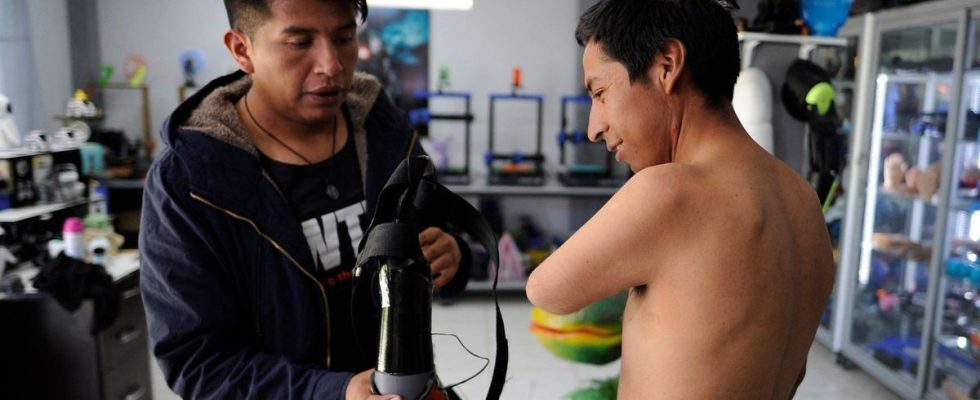Published on
Updated
Reading 2 min.
Surrounded by prosthetics and 3D dinosaurs, Roly Mamani checks the articulated arm he has just designed. For six years, this 34-year-old engineer has been putting his creativity as a toy maker at the service of the most deprived amputees in Bolivia.
Son of farmers, Roly Mamani grew up in poverty in Achocalla, a town about fifteen kilometers from the capital La Paz. Not having any toys, he began building his own cars out of cardboard and plastic at the age of six.
Before entering university, he worked for two years in an automobile workshop. These were “the first real machines I saw,” the electronics engineer recalled to AFP.
Eloquent, but not very smiling, Roly Mamani returned to Achocalla about ten years ago with the idea of manufacturing robots for recreational or educational purposes.
However, the story of a farmer with no hands got him thinking. “I can create some for him“, he said to himself when hearing about this case and that of other people who lack limbs and resources to be able to access a prosthesis.
In 2018, he began manufacturing prosthetics with his 3D printers. “Science is like a superpower“, he said. If robotics “doesn’t help with important things, so it’s useless“, he continues.
“The most deprived people are exposed to precarious jobs, without security, and this is why they have accidents“, he explains.
With the sound of his printers in the background, he explains that he can create up to six prosthetics per month. And claims to have made more than 400 since he started. Half were distributed free or at cost.
“Ordinary person”
On average, each prosthesis has a commercial value of around $1,500 in a country where the base salary is $323.
After making himself known, mainly on social networks, he now receives many requests, including from foreign countries.
His brother, Juan Carlos, is a physiotherapist and directs the kinesthetic process of his patients.
In Bolivia, the public health system does not cover prostheses. According to the state-run National Committee for Persons with Disabilities, there are approximately 36,100 people with physical and motor disabilities in the country.
Pablo Matha, 59, lost his sight and right hand seven years ago while handling dynamite in a mine. “I went out to the street every day to beg for a few coins“, he says, explaining that he managed to strum a few chords on the guitar thanks to a hair clip from his wife. “That’s where my friend Roly and his brother found me“, he continues.
With the prosthesis that was given to him, he says he lost the shame of his “cut hand”. Before, “I felt like people were looking at me and laughing. But now that I have the prosthesis (…) I feel like I’m just like any other ordinary person“, he said.
One of Roly Mamani’s prostheses also gave Marco Antonio Nina, 26, a taste for life again. As a teenager, while working on a masonry site, an electric shock severed his left arm and atrophied his right hand. “This prosthesis is a blessing“, he assures.
Roly Mamani is now planning to create a rehabilitation center for amputees. “I will not give up on my goal of improving people’s quality of life. I want to generate my own technology, I have to improve“, declares the one who obtained a scholarship from the United States for studies in robotics.

